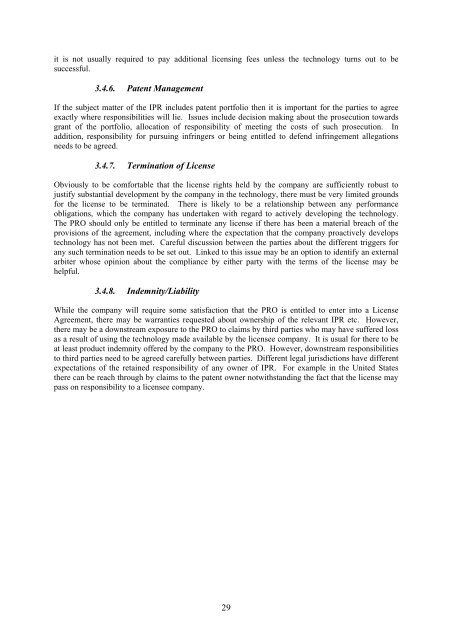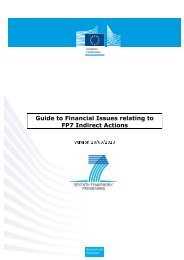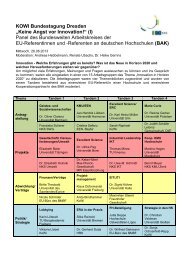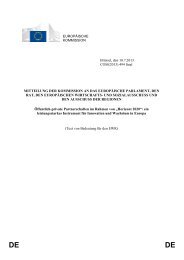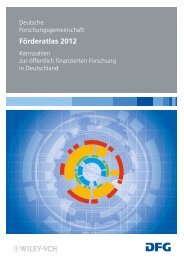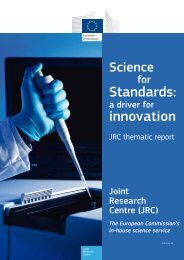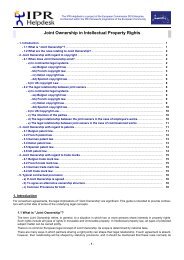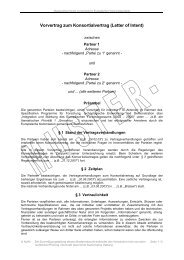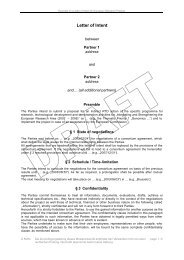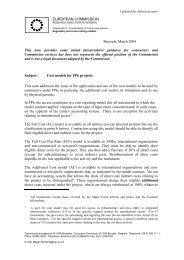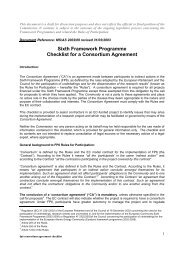Expert Group Report Management of Intellectual Property in ... - KoWi
Expert Group Report Management of Intellectual Property in ... - KoWi
Expert Group Report Management of Intellectual Property in ... - KoWi
Create successful ePaper yourself
Turn your PDF publications into a flip-book with our unique Google optimized e-Paper software.
it is not usually required to pay additional licens<strong>in</strong>g fees unless the technology turns out to be<br />
successful.<br />
3.4.6. Patent <strong>Management</strong><br />
If the subject matter <strong>of</strong> the IPR <strong>in</strong>cludes patent portfolio then it is important for the parties to agree<br />
exactly where responsibilities will lie. Issues <strong>in</strong>clude decision mak<strong>in</strong>g about the prosecution towards<br />
grant <strong>of</strong> the portfolio, allocation <strong>of</strong> responsibility <strong>of</strong> meet<strong>in</strong>g the costs <strong>of</strong> such prosecution. In<br />
addition, responsibility for pursu<strong>in</strong>g <strong>in</strong>fr<strong>in</strong>gers or be<strong>in</strong>g entitled to defend <strong>in</strong>fr<strong>in</strong>gement allegations<br />
needs to be agreed.<br />
3.4.7. Term<strong>in</strong>ation <strong>of</strong> License<br />
Obviously to be comfortable that the license rights held by the company are sufficiently robust to<br />
justify substantial development by the company <strong>in</strong> the technology, there must be very limited grounds<br />
for the license to be term<strong>in</strong>ated. There is likely to be a relationship between any performance<br />
obligations, which the company has undertaken with regard to actively develop<strong>in</strong>g the technology.<br />
The PRO should only be entitled to term<strong>in</strong>ate any license if there has been a material breach <strong>of</strong> the<br />
provisions <strong>of</strong> the agreement, <strong>in</strong>clud<strong>in</strong>g where the expectation that the company proactively develops<br />
technology has not been met. Careful discussion between the parties about the different triggers for<br />
any such term<strong>in</strong>ation needs to be set out. L<strong>in</strong>ked to this issue may be an option to identify an external<br />
arbiter whose op<strong>in</strong>ion about the compliance by either party with the terms <strong>of</strong> the license may be<br />
helpful.<br />
3.4.8. Indemnity/Liability<br />
While the company will require some satisfaction that the PRO is entitled to enter <strong>in</strong>to a License<br />
Agreement, there may be warranties requested about ownership <strong>of</strong> the relevant IPR etc. However,<br />
there may be a downstream exposure to the PRO to claims by third parties who may have suffered loss<br />
as a result <strong>of</strong> us<strong>in</strong>g the technology made available by the licensee company. It is usual for there to be<br />
at least product <strong>in</strong>demnity <strong>of</strong>fered by the company to the PRO. However, downstream responsibilities<br />
to third parties need to be agreed carefully between parties. Different legal jurisdictions have different<br />
expectations <strong>of</strong> the reta<strong>in</strong>ed responsibility <strong>of</strong> any owner <strong>of</strong> IPR. For example <strong>in</strong> the United States<br />
there can be reach through by claims to the patent owner notwithstand<strong>in</strong>g the fact that the license may<br />
pass on responsibility to a licensee company.<br />
29


